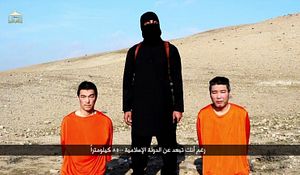The beheading of two Japanese citizens at the hands of the Islamic State has sent shock waves through Japan. Over the past two weeks the Japanese public followed the unfolding drama, with domestic media providing in-depth analysis of every video and voice recording released by the hostage-takers. A tearful statement from the mother of murdered journalist Kenji Goto added to a national sense of distress. Meanwhile, ominous televised images of ISIS fighters roaming Iraq and Syria and coverage of the group’s latest threat to Japanese citizens fuel a growing sense of fear that Japan is vulnerable to international terrorism. With Prime Minister Shinzo Abe vowing to make ISIS “pay for their sins,” the hostage crisis has triggered a debate on Japan’s role in the Middle East both within Japan’s parliament, the Diet, and among the wider public. The crisis has thus become a moment of truth for Abe’s activist foreign policy in a region which fulfills the bulk of Japan’s energy needs but also one in which Japan has traditionally been wary of entering into messy political entanglements.
Ninety percent of Japanese oil comes from the Middle East, with nearly ten percent of that supply coming from Iran. Historically Japan has imported oil from the region while attempting to steer clear of Middle East politics, of which most Japanese have little knowledge. However, the reality of its economic interests and its alliance with the U.S. has at times rendered such neutrality difficult, if not impossible. The 1973 OPEC embargo awoke many Japanese to the political consequences of their Middle East oil dependence. More recently, Tokyo has come under significant pressure from Washington to play a supporting role in the U.S.-led wars in Iraq and Afghanistan, as well as to curtail imports of Iranian oil. On all of these fronts, Japan obliged, but in the face of significant public opposition to engaging in Iraq and Afghanistan in particular.
The ISIS hostage crisis, which was a direct response to Abe’s pledge of $200 million in non-military humanitarian assistance to the war against ISIS, provides a fresh reminder to the Japanese public of the costs of heightened involvement in the Middle East. In the short term, while Abe’s ruling Liberal Democratic Party (LDP) has seized on the hostage crisis to push its own agenda of loosening restrictions imposed by Japan’s pacifist constitution on the use of force, highlighting the inability of the Japanese government to come to the aid of its own citizens, in the longer term support for this is likely to diminish. Abe’s activist foreign policy still faces competing pressures from a largely pacifist and isolationist public that holds deep reservations toward a more muscular foreign policy. Abe is also under pressure from opposition parties, such as the Democratic Party of Japan (DPJ), which criticized his recent overtures in Middle Eastern capitals, even going so far as to suggest that Abe’s pledge of support to the anti-ISIS coalition was to blame for the hostage crisis.
While the murders of Japanese citizens by ISIS may embolden Abe and his fellow hawks to further their agenda of removing constraints imposed on Japan’s self-defense forces, it could also have unintended consequences in terms of both domestic backlash and tensions with Korea and China, which have heightened since Abe took power.
At the same time, the beheadings have also made many Japanese aware that the threat of ISIS is truly global, and rather than instrumentalizing the tragedy to advance his own political agenda, Abe can use this moment to raise public awareness about how Japan’s foreign policies, trade included, impact its national security. Such public education, in turn, can be used to build support for continued Japanese non-military engagement in the international coalition to defeat ISIS. Unlike the U.S., Japan has credibility and soft power in the Middle East and can play a mediating role for the U.S. and other Western countries. For instance, Japan could help engage the Egyptian government in a way that promotes stability but also nudges Egypt toward greater respect for human rights. Japan is also a world leader in humanitarian relief and possesses some of the best practices in areas such as refugee assistance, something that is badly needed given the desperate conditions in which millions of Syrian refugees find themselves. It is precisely this kind of assistance that Abe promised during his recent Middle East trip.
Mieczyslaw P. Boduszynski served as a U.S. diplomat for nearly a decade, with postings in Albania, Kosovo, Japan, Egypt and Libya and currently teaches U.S. foreign policy at Pomona College in California, USA. He has written for the Los Angeles Times, Christian Science Monitor, and Project Syndicate. Christopher K. Lamont teaches at the University of Groningen (Netherlands) and the Osaka School of International Public Policy. He is an expert on transitional justice, Japan, and Tunisia.

































